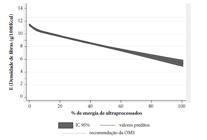Abstract
The consumption of dietary fiber in Brazil and its relationship with the intake of ultra-processed foods was evaluated. The analysis used food consumption data, with a 24-hour food record of residents aged ≥10 years (n=34.003) from the 2008-2009 Family Budgets Survey. The food products were divided into groups: in natura or minimally processed ingredients; processed culinary ingredients; processed and ultra-processed ingredients. The contribution of each food group and selected subgroups to the total fiber intake, the relation between quintiles of ultra-processed foods (evaluated by the % of total energy intake), average dietary fiber content (g/1,000kcal), and the prevalence of inadequate fiber consumption, was estimated. In natura or minimally processed foods revealed significantly higher fiber density than ultra-processed foods and corresponded to the majority percentile contribution of dietary fiber, notably derived from rice and beans. Individuals in the largest quintile of ultra-processed consumption were 1.5 times more likely to ingest inadequate fiber intake. The consumption of ultra-processed foods had a negative impact on fiber intake. Reducing the consumption of these foods can bring benefits to the quality of the Brazilian diet.
Key words:
Dietary fiber; Food consumption; Dietary surveys; Nutritional epidemiology; Industrialized foods

 Thumbnail
Thumbnail
 Notas: Coeficiente=-0,07 e Intervalo de Confiança de 95% -0,074; -0,067. Recomendação OMS=12,5g/1.000kcal.Fonte: Pesquisa de Orçamentos Familiares 2008-2009, IBGE.
Notas: Coeficiente=-0,07 e Intervalo de Confiança de 95% -0,074; -0,067. Recomendação OMS=12,5g/1.000kcal.Fonte: Pesquisa de Orçamentos Familiares 2008-2009, IBGE.